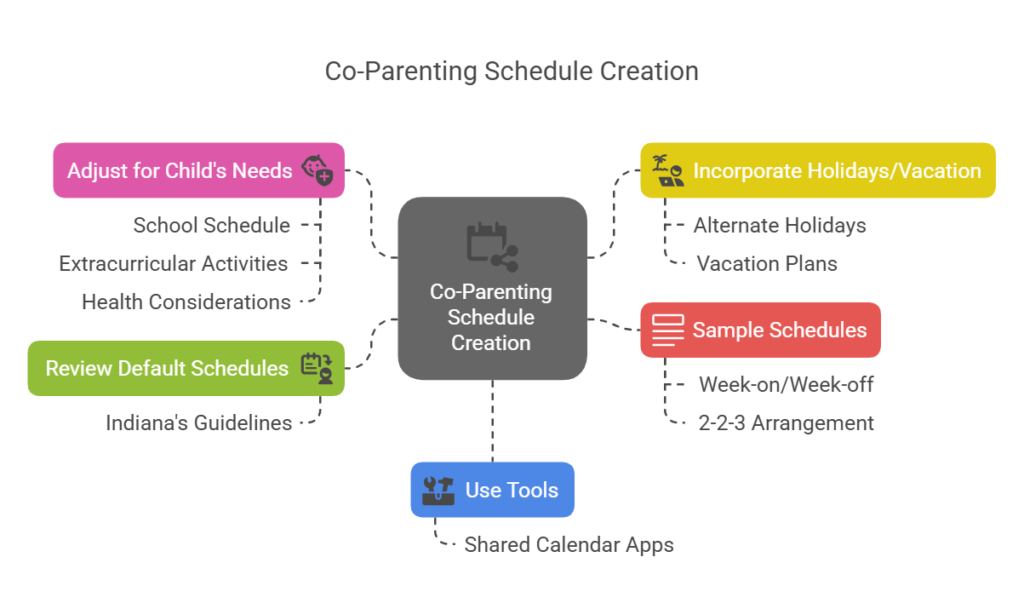Co-parenting can be hard, particularly when their parents have to share time. Indiana parenting time guidelines recommend that time be divided fairly so parents have quality time with their child. Sticking to these rules can help parents reduce conflict and maintain a more stable environment for their children. Here’s a look at Indiana’s time guidelines that can help you co-parent.
Understanding Indiana Parenting Time Guidelines What are they?
Indiana parenting time guidelines are limited in codified law in Indiana code 31-1-2-12. They emphasize parenting time instead of legal custody. These guidelines were established to provide better security and interest for the child, while also helping to reduce disputes between parents.
Key components
- Age Specific Schedules
The guidelines offer separate schedules for infants, school-age children and teenagers.
- Holiday/Vacation Rotations
They outline how holidays and vacations should be shared between parents helping to create fair arrangements.
- Transportation Responsibilities
The guidelines specify who is responsible for transporting children for visits which helps streamline the process.
Benefits of Adhering to the Guidelines
Following Indiana’s parenting time guidelines offers several significant benefits:
- Predictability & Children’s Stability: A predictable routine gives children the knowledge of what is coming next allowing them to have a sense of control/stability in their lives.
- Conflicts by Establishing Clear Expectations: When divorce settlement guidelines are clear, both parents know what to expect from one another, minimizing misunderstandings and reducing potential conflicts.
- Legal Protection in Court Disputes: Following these guidelines can add a layer of legal protection for parents in these matters as it clarifies that parents abide by established practices recognized by the court.
Co-Parenting Schedule Using the Guidelines

Creating a co-parenting schedule can be straightforward by following these steps:
Step-by-Step Process
- Review Indiana’s Default Schedules
Familiarize yourself with standard parenting time schedules provided in Indiana’s guidelines. These can be a good starting point for your plan.
- Adjust for Child’s Needs
Think about your child’s individual needs and those will include their school schedule, extracurricular activities and any health considerations. Adjusting the schedule according to these factors is important so their well-being is ensured.
- Incorporate Holidays/Vacation
Have a plan for holidays and vacations. For example, you can alternate Christmas and other important holidays, so parents get quality time with their child.
- Use Tools
Use shared calendar apps to keep everyone in the loop and organized. These tools can assist in organizing schedules and relating modifications properly.
- Sample Schedules
Play around with week-on/week-off or week-day-sharing arrangements, for example, from 2-2-3, 2 days with 1 parent, 2 days with the other, and 3 days with 1 parent.
Legal Considerations
It’s essential to know your Rights when it comes to Co-Parenting:
- Court Use: The parenting time guidelines are usually the default framework that the court will refer to neglect issues that must be addressed and result in a different approach.
- Adjustments: If you need to make adjustments to the parenting time. For example, you can file a motion with the court if you have moved or changed jobs. It will need to be appropriately documented and justified.
- Contempt Risks: Ignoring the scheduled parenting time agreed to in advance could result in contempt and the potential for penalties from the court or reduced parenting time.
Tips for Successful Co-parenting
Here are the following tips for successful co-parenting:
Communication
Discuss arrangements on neutral communication platforms. This minimizes potential misunderstandings and keeps any conversation away from negative past experiences. There are chances to lose custody for not co-parenting with poor communication. Prioritize regular communication about your child’s needs, activities and any changes that might affect the parenting schedule. Try to stay calm and respectful, it could lead you towards hazardous situation. Remember to schedule regular check-ins to talk about how co-parenting is going.
Flexibility
Your ability to change plans when unforeseen things happen, e.g., your child gets sick or something came up at the last minute, demonstrates your desire to put their needs first. Consider setting clear guidelines for last-minute changes like contacting the other parent immediately to make alternative plans. This can help minimize stress and involve both parents in decision-making.
Documentation
Maintain a detailed log of every agreement including parenting schedules and meaningful discussions about your child’s care. Use shared documents or co-parenting apps to do this. Documenting agreements and understanding prevents disputes and informs on what was said. This comes in particularly handy. A record is essential in ensuring the guidelines are followed and that both parents are responsible for what was arranged.
Common Mistakes to Avoid
When following Indiana’s parenting time guidelines as a parent, it is important to avoid these mistakes.
Ignoring the Child’s Preferences
Children’s preferences and development needs should be a priority in co-parenting arrangements. Ignoring their feelings about living arrangements can lead to emotional distress. As children grow and their needs change, it’s essential to regularly assess the schedule to ensure it remains appropriate for their age and circumstances. Listening to their input builds trust and helps them feel valued.
Using Children as Messengers
Having kids be the messengers can put them in the middle of adult battles, which is unfair and stressful for kids. This confusion promotes loyalty conflicts and makes it very tough for kids to have a good relationship with their parents. Keep all communication direct with parents, and respectful. It helps to avoid pressure on the child and miscommunication.
Failing to Formalize Agreements Legally
While it may seem that a verbal agreement is enough, the lack of a written contract can lead to misunderstandings and disputes. Putting off legally formalizing custody and parenting time arrangements can expose one or both parents. Document all agreements formally through the court. This gives both parents legal support and a path to follow.
Conclusion
These Indiana Parenting Time Guidelines help significantly lessen the stress on parents and children by offering a specific framework. Wait for such a time when your kids won’t have conflicts with their parents because these guidelines are followed. A family attorney can also help you create a co-parenting plan that suits your situation.
FAQs
No, the parenting time guidelines are not mandatory but courts often favor them when making decisions regarding custody and visitation.
Parents can deviate from the established schedule if both parties agree to changes.
It’s advisable to hire a lawyer in high-conflict situations such as significant disagreements about parenting time.


